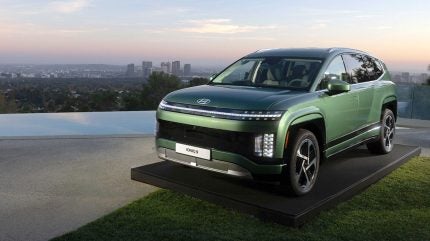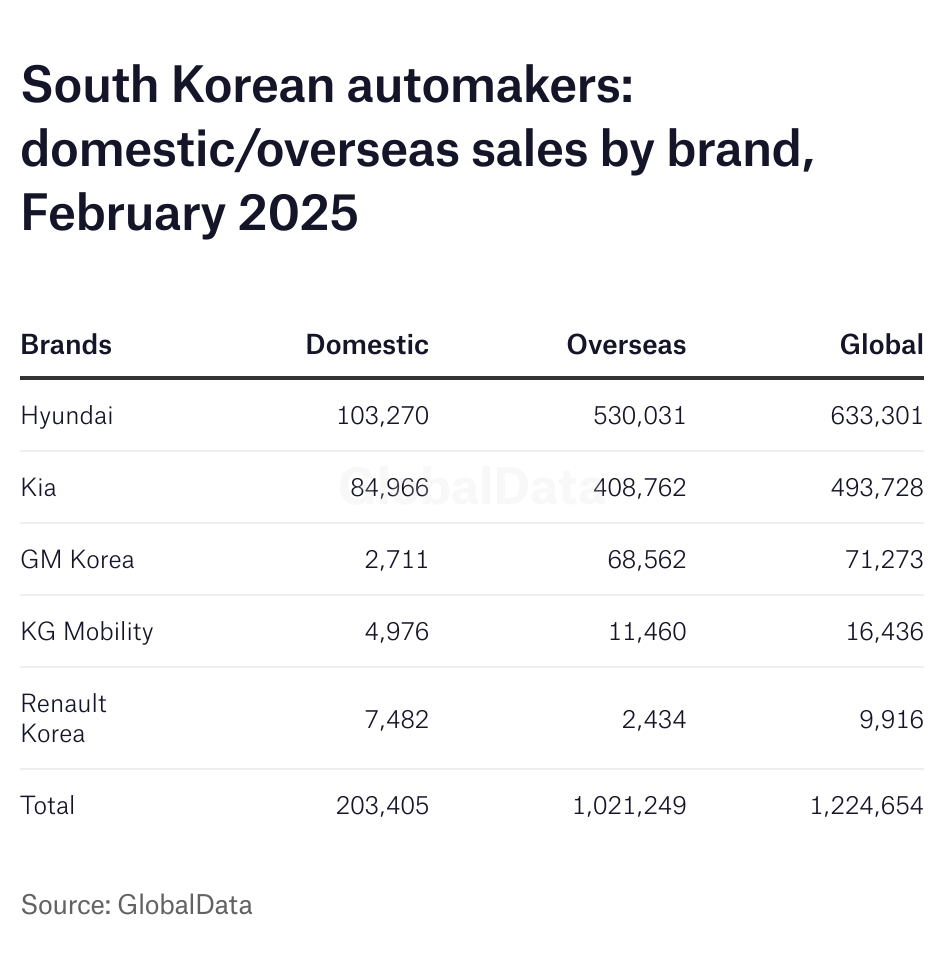
Domestic sales by South Korea’s five main automakers combined rose by 13% to 112,258 units in February 2025 from 99,203 units a year earlier, according to preliminary wholesale data released individually by the manufacturers. The data do not include sales by South Korea’s low-volume commercial vehicle manufacturers including Tata-Daewoo and Edison Motors, while import brands are covered in a separate report later in the month.
The market last month rebounded from weak sales in January, when sales were held back by fewer working days due to the Lunar New Year holidays – which last year fell in February. Vehicle demand in the country remains sluggish, however, due to high household debt and weak sentiment – with consumers spending less on durable goods. Corporate sentiment has also taken a hit due to uncertainty over US trade policies.

Discover B2B Marketing That Performs
Combine business intelligence and editorial excellence to reach engaged professionals across 36 leading media platforms.
The latest economic data show GDP growth slowed to 1.2% year-on-year in the fourth quarter of 2024, from 1.5% in the third quarter and 2.8% in the first quarter of last year. The central bank continued to cut its benchmark interest rate in February, to 2.75%, to help support domestic consumption.
In the first two months of the year the country’s five main domestic vehicle manufacturers reported a slight increase in domestic sales to 203,405 units from 201,922 in the same period of last year. Hyundai drove the market higher with sales rising by 6% to 103,270 units year-to-date, while Kia’s sales fell by 5% to 84,406 units. GM Korea reported a 44% plunge to 2,711 units, while KG Mobility saw its sales drop by 33% to 4,976 units. Renault Korea’s sales more than doubled to 7,482 units, following the recent launch of the Geely-based Grand Koleos hybrid SUV.
Global sales by the country’s “big-five” automakers, including vehicles produced overseas, rose slightly to 1,224,654 units in the first two months of 2025 from 1,223,115 units a year earlier, with overseas sales also just slightly higher at 1,021,249 from 1,020,736 units.

Hyundai Motor’s global sales rose by over 2% to 322,339 units in February 2025 from 315,593 a year earlier, reflecting a sharp rebound in domestic sales while overseas sales continued to weaken. Sales in the first two months of the year were just slightly lower at 633,301 units compared with 633,416 previously.
Domestic sales rebounded by 20% to 57,216 units last month from 47,653 a year earlier, with SUVs accounting for 19,769 units and the Genesis luxury brand accounting for 10,224 units. Sales in the first two months of the year were up by 6% to 103,270 units from 97,463 a year earlier, following a 7% decline in January.
Overseas sales fell by 1.1% to 265,123 units in February from 267,940 units a year earlier, while year-to-date sales were also 1.1% lower at 530,031 units from 535,953 previously, underpinned by strong demand in North America while sales in India weakened. The company’s new EV plant in the US state of Georgia became partially operational last October, producing the Ioniq 5, with output set to be ramped up later this year with the introduction of new Hyundai and Kia models including the Ioniq 9.
Hyundai has set a global sales target of 4,174,000 vehicles for 2025, including its Genesis luxury brand, representing a slight increase over 2024 volumes. This includes 710,000 domestic sales and 3,464,000 overseas sales. To achieve this goal, the company said it will focus “on strengthening its market competitiveness with a stronger range of electrified models, including hybrids and battery electric vehicles, and scaling up local production at its global manufacturing facilities.”
Kia’s global sales rose by 4.5% to 253,850 vehicles in February from 242,917 a year earlier, reflecting a rebound in domestic sales following a sharp decline in January and stronger overseas sales growth. Sales last month were underpinned by strong demand for the Sportage SUV, with 46,287 sales globally, followed by the Sorento and Seltos models with 24,173 and 24,040 sales respectively. Global deliveries in the first two months of the year increased by 1.1% to 493,728 units from 488,503 previously.
Domestic sales rose by 4.5% to 46,003 last month from 44,008 units a year earlier, with the Sorento being its best-selling model with 9,067 domestic deliveries, followed by the Carnival MPV with 7,734 units and the Sportage with 6,568 sales. Year-to-date domestic sales were down by 5% to 84,406 units from 88,616 a year earlier, following a 14% decline in January. The company sold a further 560 special vehicles, up from 273 a year earlier, most of which were delivered to domestic clients.
Overseas sales increased by 4.4% to 207,462 units last month from 198,636 a year earlier and by 2.3% to 408,762 units year-to-date from 399,430 units, underpinned by a 9% rise in US sales to 120,310 units. The Sportage was the brand’s best-selling model overseas with 39,719 deliveries.
Kia is targeting a 4% increase in global sales to 3,216,200 units in 2025, including 550,000 domestic sales, 2,658,000 overseas sales and 8,200 SPV sales, supported by the recent launch of the new K4 and revamped K5 sedans and the Syros SUV in India. This year the company plans to roll out its new Tasman pickup truck, followed by the EV4 and EV5 BEVs. The company’s medium-term plan is to sell 4.3 million vehicles globally by 2030, including 1.6 million BEVs.
GM Korea’sglobal sales surged by 26% to 39,655 units in February from 30,630 units a year earlier, following a 27% drop in January, as overseas shipments rebounded strongly while domestic sales continued to plunge. Sales in the first two months of the year were down by 3.5% to 71,273 units from 73,824 units previously. The Trailblazer SUV and Trax crossover vehicle remain by far the company’s best-selling models, with most output shipped overseas.
Domestic sales continued to drop last month, by 25% to 1,482 units from 1,987 units a year earlier, resulting in a 44% plunge in year-to-date sales to 2,711 units from 4,881 units – as the automaker struggled with rising competition from other domestic manufacturers and from importers.
Exports rebounded by 33% to 38,173 units in February from 28,643 a year earlier, with the Trax model alone accounting for 26,114 units, while year-to-date exports declined slightly to 68,562 units from 68,943 units. The company said it is stepping up its marketing efforts to help lift sales following last month’s sharp declines.
KG Mobility’s (KGM) global sales fell by 10.5% to 8,456 units in February from 9,452 units a year earlier, reflecting weak domestic demand while overseas sales increased slightly. Total sales in the first two months of the year were down by almost 12% to 16,436 from 18,624 a year earlier. The company, previously known as Ssangyong Motor, was acquired in late 2022 by a consortium led by local steel and chemicals firm KG Group.
Domestic sales continued to plunge last month, by 29% to 2,676 units from 3,748 a year earlier, resulting in a 33% drop to 4,976 units year-to-date from 7,510 units, as the automaker struggled to keep up with rising competition from other domestic manufacturers and from importers.
Overseas sales rose slightly to 5,780 units in February from 5,704 a year earlier, underpinned by increased shipments of the Torres and Korando models to Kazakhstan and Turkey, while year-to-date volumes rose by 3% to 11,460 from 11,114 units – as the company continued to expand into new markets.
KGM plans to further expand its zero-emissions vehicle range, following the launch of a new minivan version of the Torres EVX battery-powered SUV last September. The company began taking orders for its new battery-powered Musso EV pickup at the end of last month.
KGM recently announced it had signed a strategic partnership with China’s Chery Automobile Company, involving platform licensing and product sharing aimed at helping it strengthen its SUV line-up. The deal will also give KGM access to readily available new energy vehicle (NEV) technologies including vehicle platforms.
Renault Korea‘s global sales fell by 11% to 6,099 units in February from 6,877 units a year earlier, reflecting plunging overseas sales while domestic sales continued to rise sharply from low levels. Global sales in the first two months of the year were up by 13% to 9,916 units from 8,748 a year earlier – reflecting strong growth in January.
Domestic sales continued to surge last month, by 170% to 4,881 units from 1,807 units a year earlier, resulting in year-to-date sales more than doubling to 7,482 units from 3,452 previously – reflecting the recent launch of the new Geely-based Grand Koleos hybrid SUV. The company recently upgraded its Busan plant, resulting in more production being allocated for the local market, according to local reports.
Exports fell by 76% to 1,218 units in February from 5,070 a year earlier, after surging fivefold in January from depressed year-earlier levels, while year-to-date volumes were still down by 54% to 2,434 units from 5,296 previously – mostly comprising shipments of the Arkana hybrid crossover vehicle (a rebadged XM3).
Renault Korea last year confirmed it will continue to overhaul its product range with a strong focus on SUVs, BEVs and hybrid vehicles, starting with the launch of the new Geely-based Grand Koleos hybrid SUV last July and the phasing out of its aging SM6 mid-size sedan at the end of last year. The company recently agreed to produce the Geely Polestar 4 BEV at its Busan plant from the second half of 2025, for sale domestically and for export.






